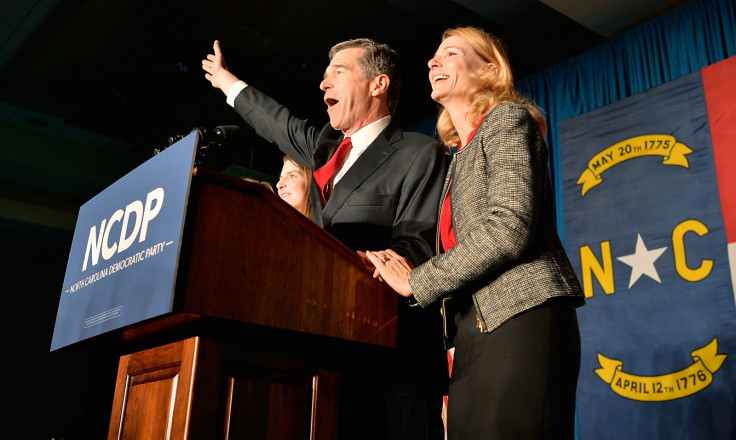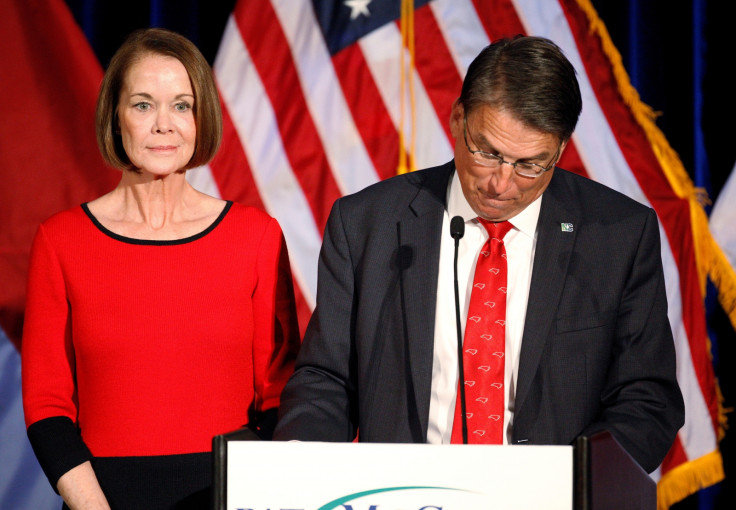In North Carolina, the election just won't end
An incumbent that won't concede and exponential legal challenges threaten to keep it going even longer.
Almost a month since the election took place, North Carolina's gubernatorial race is still going on. Where nationally, Hillary Clinton called Donald Trump and conceded the election, North Carolina's incumbent Governor is challenging every step of a vote that he has almost certainly lost.
On Friday 2 December morning, the state's electoral board showed that Roy Cooper, the Democratic candidate was leading Pat McCrory, the Republican governor, by 10,267 votes. A lead that has been growing as each precinct certifies its count.
But McCrory isn't going easily. He has refused to concede until every vote is counted and his supporters have set about challenging the counts in North Carolina's 2704 precincts. Initial challenges concerned voters eligibility, with accusations that dead people and felons had cast ballots.
Subsequent reviews of these accusations found them to be largely false and the State Board of Elections, a Republican controlled body, advised county boards to dismiss allegations of voter fraud on grounds on ineligibility.
McCrory's last grabs might have looked like desperate ploys but then on Wednesday night his camp got a last wind. The State Board of Elections said that in Durham county, 94,000 votes have to be recounted.
The votes had come in late from one election day precinct and five early voting sites – when they did come in, they changed the outcome. McCrory had looked to be in front until the votes had pushed Cooper in the lead. How the recount goes will affect the next steps of the election.
Though the McCrory camp have asked for a state-wide recount, The State Board of Elections explained to IBTimes UK that North Carolina law states that that would only be mandatory if the winner is ahead by less than 10,000 votes. Cooper looks set to pass that margin. McCrory's campaign manager, Russell Peck, said in a release after the Durham decision that they were "pleased" with the decision and "will respect whatever the results show".
An earlier message from the campaign said that "if the Durham recount provides the same results as earlier posted, the McCrory Committee will be prepared to withdraw its statewide recount request". But others are accusing the campaign of underhand tactics.

One piece in Slate said McCrory was trying to "steal" the governorship, having lost it – suggesting that McCrory could use state law to retain power after sowing the seeds of mistrust in the election results. If an election is "contested", the General Assembly decides who received the highest number of votes. The General Assembly is Republican controlled.
If Durham's recount comes up with differing results, that could be a route McCrory takes. Whatever he decides, his reputation, already soured, is taking an impressive hit. McCrory came under huge criticism during his term for 'House Bill 2', a law that forbid re-establishing anti-discrimination protections for LGBT people and said that in government buildings people had to use the bathroom that corresponded with the gender on their birth certificate.
Now as he continues to refuse to concede, local media has not held back. The Charlotte Observer said he would be "remembered for this lack of grace", accused him of tilling the ground "for future voter suppression". The Greensboro News and Record said his actions were "unjustifiable and inexcusable." The New York Times editorial board called McCrory "dishonourable" and named him "North Carolina's Sore Loser."
Elsewhere the Southern Coalition for Social Justice, an anti-racist non-profit in North Carolina, released a statement from their senior voting rights attorney calling McCrory's actions "partisan efforts to sabotage an election".
The North Carolina Democratic Party have, of course, not been silent either. They have called the recount request "another desperate attempt from the McCrory campaign to undermine the results of an election they lost." While Cooper's campaign manager, Trey Nix, said there was "no path to victory for Governor McCrory. It's time for Governor McCrory to accept the election results and respect the will of the voters."
North Carolina is very much a swing state. In this election, the presumptive Governor-elect is a Democrat while the Lieutenant Governor, who acts in a similar capacity as the Vice President to the President, is a Republican.
Being voted for separately, it's not the first time the two have come from different parties though it is the first time this way around. From 1973-77, Republican governor James E Holshouser Jr. had a Democrat Jim Hunt for Lieutenant; Similarly Gov. James G. Martin had a Democrat below him between 1985-89, before a Republican Lieutenant won.

Even more recently, in 2014 a statewide recount did occur in the election for state supreme court – a recount that simply reaffirmed the original winner.
Even after Durham county's recount, which will reportedly take around a week and cost several thousand dollars, there are other legal battles that could hold up the final verification of totals. In Bladen County the State Board of Elections has taken jurisdiction over investigations into allegations of irregularities in mail-in absentee ballots.
Meanwhile a conservative think-tank is suing the State Board of Elections and its members for including same-day registered voters in the final certified votes – they allege that these ballots contravene North Carolina law because they "will be counted without the voter registrations having been verified".
Even if the allegations of voter fraud and the recounts were upheld, the chances of there being any difference in the outcome is incredibly slim – bringing up the question, why is McCrory still fighting what seems inevitable? Republicans are saying that it is to uphold the integrity of the election system – much the same argument being used by the Green Party's Jill Stein as she raises funds for recounts in Wisconsin, Pennsylvania and Michigan. In response to Stein's actions, Republicans have taken a different position, calling the recounts "pointless".
The election of North Carolina's next governor has now taken almost a month, with continuing legal challenges threatening to continue the race. With just over a month until the 7 January inauguration, will the state still be battling to find its next governor?
Follow James Tennent on Twitter: @duckytennent
© Copyright IBTimes 2025. All rights reserved.






















